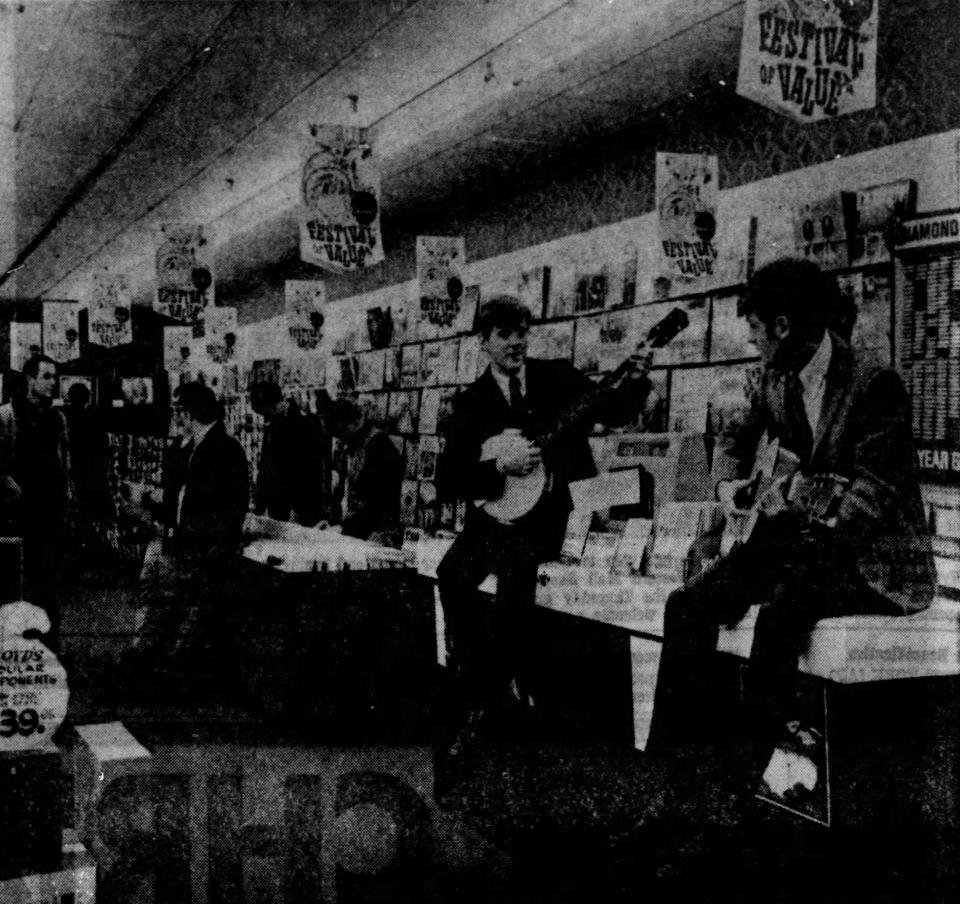How Musicland shaped the music scene for decades to come in Sioux Falls: Looking back
In the days before Spotify, Apple, Amazon and YouTube started providing much of the music consumed today, there was the record store.
Local music fans would look through the stacks in places like Odland Music, Williams Piano, and Iron Creek. When the malls came to prominence, Musicland dominated the shopping centers. The store opened its first location in the Western Mall in 1968, but had been a growing business for 12 years.
Terry Evenson opened his first Musicland store at 5th and Hennepin in Minneapolis on March 23, 1956. He had a musical background, and ran a music shop in Duluth before serving in the Korean War, where he played in his army unit’s band. He played in a jazz group at the University of Minnesota while attending school there. Music was in his blood, and he could see a way to make his living at it. His parents helped him out with a loan to make Musicland a reality.
More: Herberger's closed because Sioux Falls was 'over-retailed': Looking back
To begin with, Musicland primarily sold records, but also a selection of phonographs on which to play them. The store’s motto was “From classics to pops, our selection is tops.” By 1958, Terry had hired Grover Sayre, his college buddy and bass player in his band, Terry’s Pirates. On Sept. 19, 1958, Musicland was incorporated with Terry, Grover, and Robert A. Jaeger as partners.
In 1964, Musicland was sold to Amos and Dan Heilicher, owners of Advance Music Shops. By that time there were 15 stores in the growing chain. By early 1968, the Heilichers merged Musicland with Pickwick International, a big player in the discount record business, based in New York.
The Western Mall opened on Oct. 31, 1968, and Musicland was one of seven stores in the mall that opened the same day. Montgomery Ward had been open since Oct. 3. Musicland had a good location in the sunny interior court of the mall. Since not many stores were opening that day, it was called it a preview opening, with a grand opening on Nov. 13, when 11 additional stores would open.

Musicland had great opening day deals on your favorites from Donovan, Bobby Vinton, Tammy Wynette, and fresh platters from up-and-comers Jeff Beck and Fleetwood Mac. As was the case with earlier stores, Musicland carried stereo equipment, but added headphones, speaker systems, 8-track cartridge players, and even televisions. The store also carried a complete line of guitars starting at $12.88, and drum kits starting at $88.88.
If going to the mall was too much trouble, customers could clip one of Musicland’s advertisements from the paper, circle the desired items, and mail it to the store with a check or money order. Don’t forget to add 3% state sales tax and 35¢ for shipping and handling.
More: How the Olson brothers changed the dapper scene of Sioux Falls: Looking back
According to manager Mike Kelley, the store stocked the largest inventory of records in the state. At this time, Musicland was the largest record store chain in the US. The Western Mall store was the 20th to open, with more to come.
In 1977, Pickwick International was acquired by American Can Co. It incorporated the 230 Musicland stores as Musicland Group, Inc. In 1978, American Can added Sam Goody to its collection of stores.
In August 1978, Musicland opened a new location in the Empire Mall’s new Dayton’s wing. The Western Mall location would remain until 1981.
Seeing the growth in the home video market, Musicland Group in 1986 launched a video for sale chain, initially called Paramount Pictures. For obvious reasons, the store was later renamed Suncoast Motion Picture Company.
In October 1992, Suncoast opened in the Empire Mall, across the hall from Musicland, in the corridor connecting the Sears and Dayton’s Wings. It was a welcome synergy that brought this shopper from one store to the other, hoping to find that next, perfect album or to add the perfect movie to the growing collection of VHS tapes.
In 1995, Primerica, formerly American Can, began converting its Musicland stores to Sam Goody stores. Our local Musicland retained its original name until it was forced to close on Sept. 25, 2000. The year before, another record shop with locations in the Empire and Empire East, Disc Jockey, consolidated both stores in the Empire between JC Penney and Dayton’s. This new superstore made a deal with Empire management to be the exclusive record shop in the mall, forcing Musicland out at the end of its lease. Suncoast, unaffected by this deal, remained until 2006.
Today, the malls lack the record shops that once brought life to the shopping experience. Flipping through records, tapes, and CDs was a joyful way to spend time at the malls. The Record Shop, Musicland, and even Disc Jockey are missed. To get that experience, music lovers can still visit small record stores like Crosstown Vinyl, Total Drag, Ernie November, and Last Stop CD Shops.
This article originally appeared on Sioux Falls Argus Leader: How Musicland shaped the music scene for decades to come in Sioux Falls: Looking back

